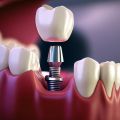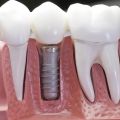Pros and Cons of Mini Dental Implants

Dental implants are a long-term tooth root replacement method that holds prosthetic teeth in place. They are a popular alternative to more traditional forms of replacing lost teeth. Implants can replace one or more teeth or secure removable dentures.
Implants are made of titanium, a strong yet lightweight metal compatible with the human body and hence do not elicit an immunological response. In fact, implants are the only ones in dentistry that stimulate bone formation. The titanium post is inserted into the bone socket of a missing tooth, and the jaw bone regenerates around the implant, securing it in place.
Implants allow you to restore your smile and self-esteem and to eat your favorite foods again, all while preserving the structural integrity of your jaw and providing you with a bite power far more significant than conventional dentures. Dental implants also support your natural teeth and can last for decades if properly cared for.
What is the difference between mini implants and standard implants?
Dental implants are classified into two types: typical implants and MDIs (mini dental implants). The primary distinction between standard and small implants is their size, durability, and general efficiency.
Traditional implants are typically made up of two parts with a diameter of 3.25 to 5 millimeters that are screwed into the bone socket of missing teeth.
Mini dental implants are one-piece solid screws that are less than 3mm in diameter and have a specific ball-shaped end that protrudes from the jaw bone. They are also known as narrow-diameter implants or small-diameter implants (NDIs and SDIs) due to their tiny size.
Regular and micro implants each have advantages and disadvantages. The condition of your mouth determines whether an implant is good for you and which type is best.
A skilled implant dentist is the only one who can identify the best implant treatment for you. However, to offer you some food for thought, we've compiled a list of the advantages and disadvantages of small dental implants vs standard dental implants.
Pros of mini dental implants
Mini implants have a significant advantage over standard implants - they can be used for individuals who have lost a substantial proportion of jaw bone structure.
A person who has worn dentures for many years has lost much of their jaw's boney support, resulting in a loose, ill-fitting bottom denture. Adding 4-6 micro-implants can provide the denture user with the comfort, confidence, and security they require to wear their lower denture proudly.
Teeth extractions without appropriate replacement, periodontitis (gum disease), tooth misalignment, and trauma when a tooth is fractured or knocked out are all causes of jaw bone atrophy.
Mini implants may be the only option for someone who has lost too much bone for regular implants and wishes to avoid a grafting surgery.
Another significant advantage of tiny implants is that they do not require extensive surgery because anchors are implanted in the jaw during a relatively non-invasive procedure. MDIs are intended to eliminate the need for bone grafting and speed up the implant procedure.
Mini implants are also less expensive than traditional implants.
MDIs are usually employed to maintain a lower denture, but they can be used to replace one or more missing teeth anywhere in the mouth.
Other advantages of mini implants:
- Better fit your existing dentures and teeth.
- Easier to chew and bite your favorite food.
- Easier cleaning.
- Less effect on your speech.
- No need for adhesives or bonding agents.
- High success rate.
- Permanent results.
- No slipping or discomfort.
Cons of mini dental implants
Because mini implants are roughly half the diameter of standard implants, two MDIs are required to perform the same function as a single standard implant. This may put greater stress on the jaw bone and result in a longer recovery time.
Regular implants are more durable than tiny implants because they allow for better weight distribution and place less long-term stress on the jaw bone. Conventional l implants' bigger surface area gives a greater chewing force.
Rubber O-rings on dentures that fit around tiny implant balls will need to be changed as they wear out or become loose. The more frequently you remove and replace your dentures, the sooner the O-rings will need to be replaced.
Standard implant or mini implant?
Anyone healthy enough to have a routine tooth extraction is a good candidate for a regular implant. However, if you have chronic illnesses, are a heavy smoker, or have had radiation therapy to the head or neck, there may be some issues. That is why mini-implants may be an acceptable alternative to regular implants.
Mini dental implants have also shown to be a highly effective method of supporting dentures. When not stimulated or trained, bone, like muscle tissue, atrophies. Dentures that are not supported by implants do not alleviate this issue because they do not replace the tooth roots. As a result, many patients choose dental implants to replace lost teeth or to act as a support for a dental plate.
Other articles and publications:
Articles and publications of other companies:
- +1 (646) 270-9836
- Long Island City
- grantny.com












